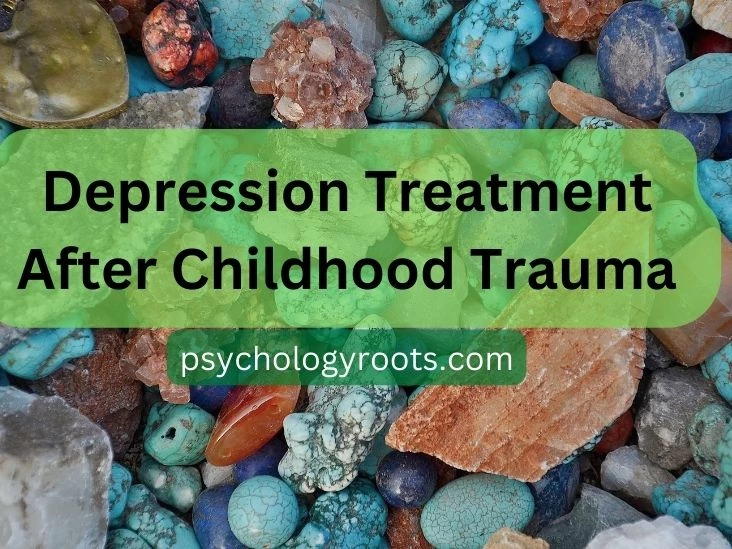Table of Contents
Depression Treatment After Childhood Trauma
Here in this post, we are discussing “Depression Treatment After Childhood Trauma”. You can read more about psychology-related material on our website. Keep visiting Psychology Roots.
Patients with major depressive disorder with a history of childhood trauma experienced more severe depression symptoms, but gained just as much from therapy as those without a history of childhood trauma.
Erika Kuzminskaite, a PhD candidate at Vrije University in Amsterdam, and colleagues reported in The Lancet Psychiatry that a history of childhood trauma was related with more severe depression at baseline, with a Hedges’ g of 0.202 showing a modest but substantial effect size.
There was no significant difference in the magnitude of the benefit from active treatment between groups based on the presence or absence of childhood trauma (treatment difference between groups g=0.016, 95% CI -0.094 to 0.125), nor was there a difference between the treatment effect and the control effect (between group difference P=0.051).

There was also no substantial difference in results based on the kind of childhood trauma experienced, the study’s design, the patient’s diagnosis of depression, the study’s quality, the number of years studied, or the therapy they received. Treatment effects for individuals with childhood trauma were greater in North American trials (P=0.0080, false discover rate adjusted).
Kuzminskaite told that “evidence-based psychotherapy and medicines” should be provided to depressed individuals notwithstanding the presence or absence of childhood trauma. Individuals at risk for a more severe course of the condition and post-treatment residual symptoms may be better identified by screening for childhood trauma.
The authors pointed out that emotional or physical neglect, or emotional, physical, or sexual abuse, is a prevalent and substantial risk factor for severe depressive illness in adulthood. The scientists warned that childhood trauma increases the risk of developing comorbidities, the severity of symptoms, and the age at which they first appear.
A doctor and researcher from the University of Toulouse in France, Antoine Yrondi, MD, PhD, commented in an accompanying editorial that this meta-analysis gives patients with childhood trauma reason to be optimistic. As the saying goes, “even if childhood trauma is not adjustable, its ramifications may be.”
Yrondi did point out, however, that some clinical aspects of early trauma patients may make it more difficult to achieve full symptomatic remission, and therefore continuing to influence everyday functioning.
Those with a history of childhood trauma may benefit from a precision medicine approach in the treatment of severe depressive disorder, Yrondi said. “Future study should concentrate on the consequences of childhood trauma on clinical aspects such sleep complaints and problems in patients with major depressive disorder, and more especially, with difficult-to-treat depression,”
The articles included in this meta-analysis span the years 1966-2019 and look at the efficacy of pharmacotherapy and psychotherapy for adults with or without a history of childhood trauma. In this study, improvement or worsening in depressive symptoms from pre- to post-acute therapy was considered the main outcome.
The studies included in this review all focused on adults who had been diagnosed with depression and had also had an evaluation for childhood trauma. Before and after the acute treatment period, the degree of depression was evaluated using clinician or self-report. Studies compared psychotherapy or pharmacotherapy for depression to a control group.
In all, 6,830 people participated in the 29 research that made up the meta-analysis. There was a wide age range (between 18 and 85), but no information was provided on gender or race. Nearly two-thirds of those with severe depressive disorder also described experiencing trauma as a youngster. Emotional neglect (58%) and emotional abuse (52%), both widespread in childhood, were the most common kinds of trauma.
The research had certain flaws, such as the fact that there was moderate to high statistical heterogeneity amongst the trials. Further, neither the impacts of gender nor the importance of controlling for relevant confounders were investigated. However, since not all authors of the research had access to the necessary patient data, there is a higher risk of selection bias.
Twenty-one out of the 29 research considered had some degree of bias, but even the trials with the lowest possible risk of bias had comparable findings.
It’s important to note that the researchers only looked at the acute therapy period, and that people with depression and childhood trauma often still have symptoms even after they’ve been alleviated. Last, the retroactive nature of the reports of childhood trauma may restrict generalizability.
Help Us Improve This Article
Have you discovered an inaccuracy? We put out great effort to give accurate and scientifically trustworthy information to our readers. Please notify us if you discover any typographical or grammatical errors.
Make a comment. We acknowledge and appreciate your efforts.
If you have any scale or any material related to psychology kindly share it with us at psychologyroots@gmail.com. We help others on behalf of you.